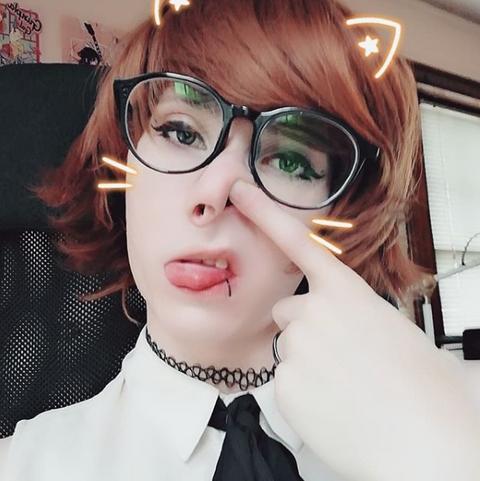
Erica Lahaie is an illustrator based out of the various Mister Donut locations in and around Osaka, Japan. She does art on music releases like VA-11 HALL-A Complete Sound Collection, on various graphic tees, in games like Heaven Will Be Mine, and on sites like nuke.com. You can support her endeavors and get cool art on Patreon, buy her merch here, or follow her horrible opinions about mint chocolate, apparently, on Twitter.
My list this year feels a lot weirder than last, if only because I played a lot less of “the big stuff," I think. A lot of my time in 2018 was either spent playing live games like FFXIV: Stormblood and Destiny 2: Forsaken or in various Taito Stations playing Chunithm until my arms fell off.
As it was year previous, my list represents my favorite game soundtracks of 2018. I like music and talking about music, and it fortuitously turns out that this list is pretty representative of the games I really clicked with overall. Neat!
9. Destiny 2: Forsaken

Composed by: Every composer under the sun, overseen by Michael Salvatori, Skye Lewin, Rotem Moav, Pieter Schlosser.
It probably feels unfair to include an expansion to a game I already put on my list last year but also: I literally put more time into the expansion than the whole of Destiny 2 Year One... so.
You'll be unsurprised to know the music in Forsaken is, like last year's game, fantastic. The 12,000,000 different composers they've brought on for the Forsaken soundtrack have done a great job of cohesively hitting various moods and styles, especially with the campaign's focus on Wanted character fights and the more ethereal atmosphere of The Dreaming City. The Last Wish raid's score is among the series' best, too. Some of its cues, like the Vault's third phase, switches me into battle-driven grins just thinking of them.
Though Forsaken’s biggest contribution is finally making Destiny 2 one of the most rewarding games to come back to week after week, its soundtrack continues to deliver as one of Bungie’s most consistent hallmarks. Well, besides skyboxes.
You can listen to the soundtrack on YouTube here or purchase on the Bungie Store.
8. God of War
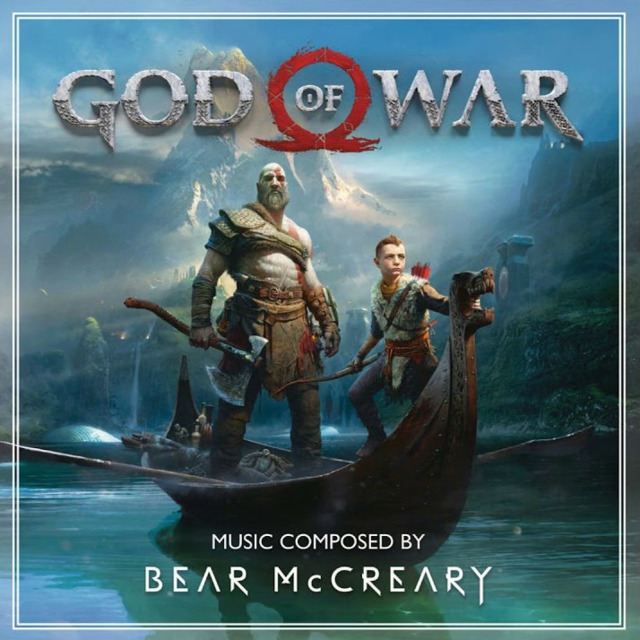
Composed by: Bear McCreary
As impotent a statement as it’ll sound proceeding what I just fawned over, AAA very rarely comes with a score that gives me anything to talk about. The amorphous blob of blaring horns comprising 95% of the music coming from LA’s music scene cast its shadow over games as it has movies, and we’ll probably never escape every major theme being some variety on a Hans Zimmer joint.
Ok look, that’s... an admittedly really cynical take on my part. But it’s there! In my mind! A lot! When it comes to this kinda stuff. So, with that at the forefront of my mind, I jumped into God of War expecting a really great-but-ultimately-forgettable score. Thankfully, Bear McCreary's (Dark Void? SOCOM 4??) work on the game is anything but. Like the game itself, the score had me somewhat speechless. I was surprised at how much God of War wasn't what I thought it would be, and McCreary's work does so much to strengthen this. Character themes are used and reused in rearranged ways to emphasize or defuse the various moods and exchanges the game has.
The whole game plays out like the most lavishly produced theatre. It's not a soundtrack, I think, that I'll ever go back to while working or something but as a "thing I experienced while playing" it was second-to-none.
You can listen to the soundtrack on Spotify or purchase it on Amazon.
7. Chunithm Star Plus
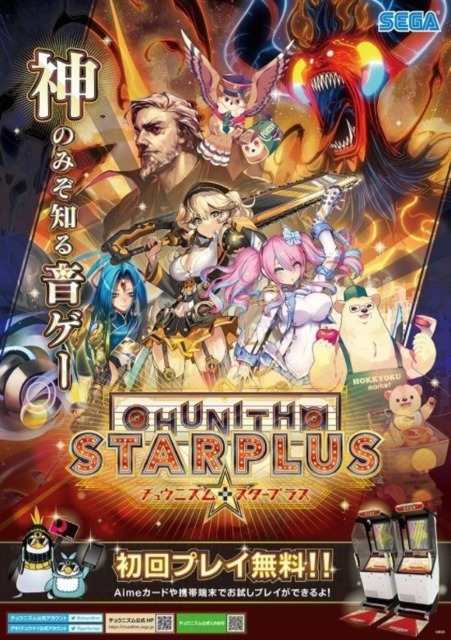
Composed by: Various Artists
I was fortunate enough to catch this year's Chunithm update, Star Plus, a short few days after launch. The only reason that's important to point out, really, is that Star Plus being a 2018 release lets me put Chunithm as a whole on this list.
Chunithm is a touch-based rhythm game, not unlike some of the more rudimentary music games you'll find on mobile. It uses a motion sensor for gestures in addition to tap or sweeping notes, requiring you to sustain notes mid-air or swipe them upwards/downwards correctly. It's simple to learn and the later stages have you waving your hands around like the most frenzied orchestra conductor, which always put a giant smile on my dumb foreigner face. Chunithm's greatest strength is how uniformly fun it is regardless of skill, a welcome break from the long-standing Bemani streak of overwhelming technical difficulty above all else.
More purposeful to this list, the songs in Chunithm Star Plus (now Chunithm Amazon) are stellar. Sega's strength with rhythm games for a bit now has been the almost dizzying variety of genres and selections and Chunithm is no different. From the Umaru-chan opening to some of Nico Nico's most popular Vocaloid originals, there's kinda something for everyone amidst the 10 categories which each house a handful of genres within.
I guess it's important for me to have Chunithm here, if only to let me give it praise for making rhythm games just fun again. Between bleeding players with two-song-per-play updates or stripping in-house musicians of credit, Konami has long abused its reign over arcades and it's been time for someone else to take over. Chunithm does just that with an eclectic range of music and the most addictive control scheme I've played... maybe ever?
There is currently no compile release of the Chunithm soundtrack, though every song is uploaded in some form as a playthrough. Sorry!
6. Minit
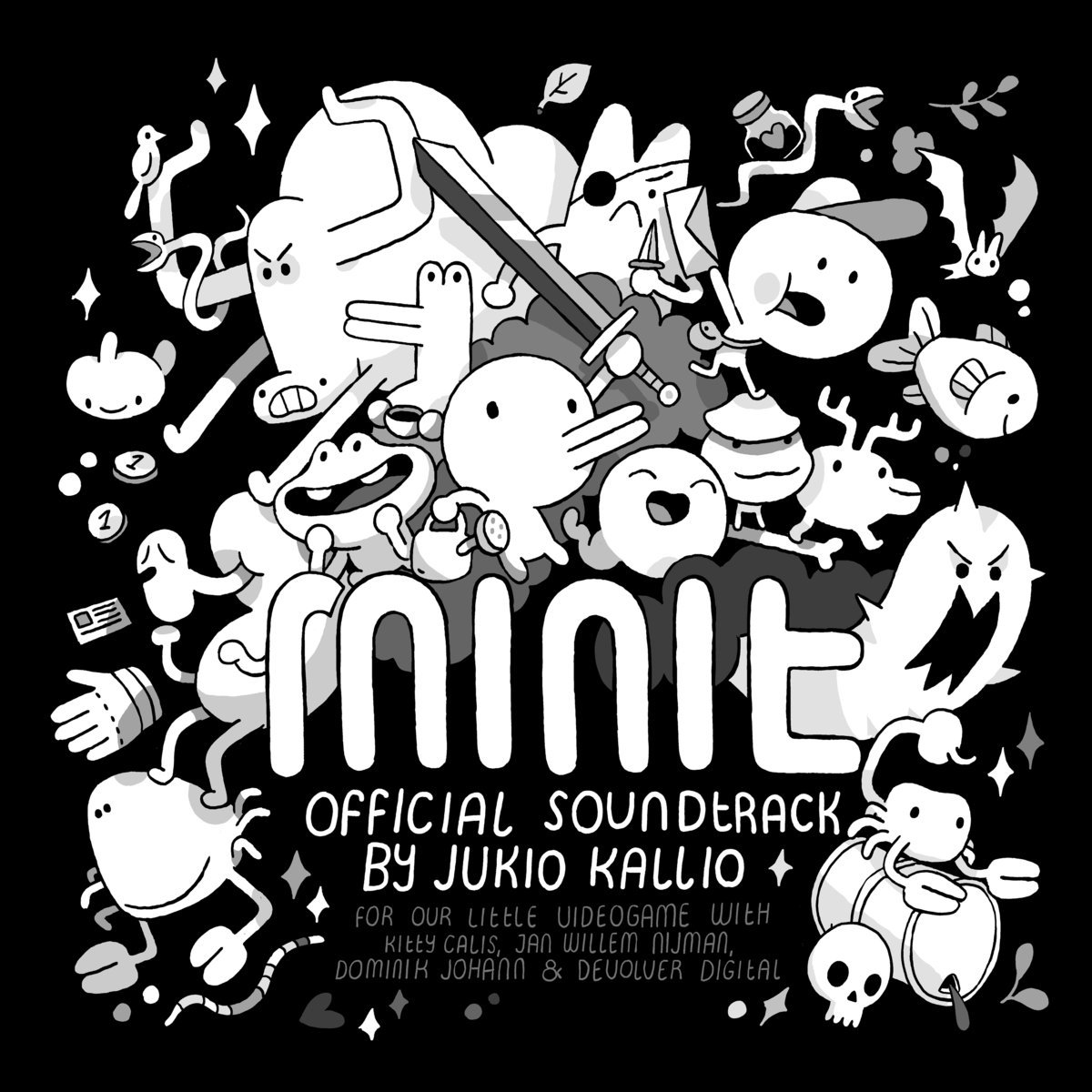
Composed by: Jukio Kallio
I wish more games had the compressed and compact sense of wonder and adventure that Minit has, and I wish more soundtracks echoed that as well as Minit's did. Jukio Kallio's (Luftrausers, Nuclear Throne) wonderful blend of upbeat and spacious chiptune, MIDI instruments, and live instrumentation is a wonderful listen on its own but it especially shines in-game.
Rapidly transitioning from one area to the next amidst an always-present 60-second timer lets you experience bits and pieces of the score, and you're rewarded with more intricate progressions as you find ways to draw out your impending reset. I end up forgetting/zoning out of OST in super quick-bite games like this but Jukio's score is an inseparable part of Minit, booming with charm in an already unique game.
You can listen to and purchase the soundtrack on Bandcamp.
5. Just Shapes & Beats
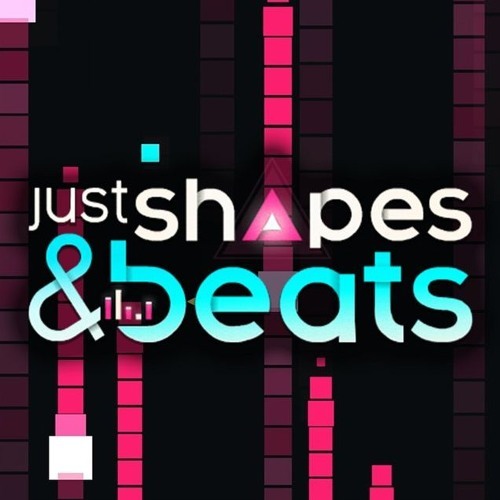
Composed by: Various Artists
Just Shapes & Beats is, conceptually, the game I've maybe always wanted to make. It's not a rhythm game, it's a pure music game. There's no performance on your part but music is absolutely the star, every stage a custom-crafted challenge completely dictated by the songs that make up its soundtrack. It's not an especially varied one--if chiptune is not you're thing you'll be hard-pressed to find much else to your liking--but it's an unabashedly vibrant soundtrack and there are very few games that have made me feel as swept up in the experience as JSnB does. I wish it was an easier game to sightread, a lot of deaths feel unfair/unpredictable, but its core experience is refreshing and fun.
You can listen to the compiled soundtrack on Spotify.
4. Octopath Traveler
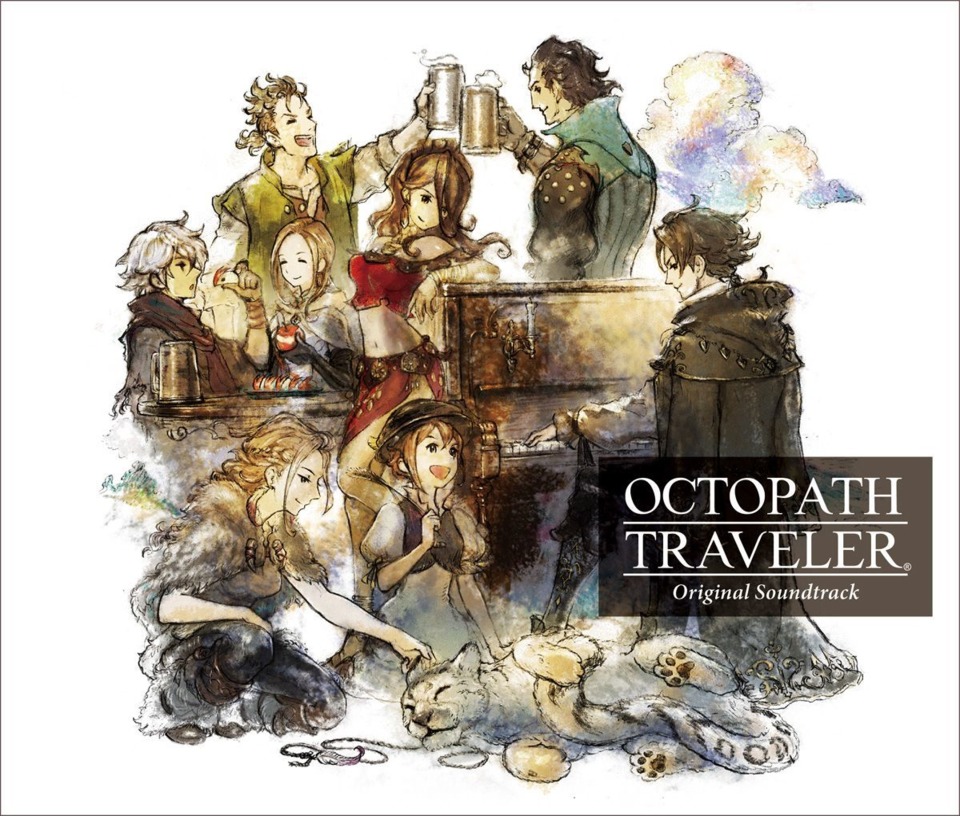
Composed by: Yasunori Nishiki
The more time I spend browsing new releases out of Japan, the more bummed I get that I can’t get into them like I used to. It’s probably just, like, thinking about the time I’d need to play them and then contrast that in my head against doing art, playing Destiny, playing Final Fantasy XIV, watching TV... I don’t know. I found the time to play a bunch of Octopath Traveler this year and I’m super happy I did, though.
Yasunori Nishiki (Beatmania IIDX, REFLEC BEAT) has composed a staggering four hours of music for the game, all of it incredibly inspired from 2D JRPGs of yore but also just... inspired in general. The game’s fractured storytelling never feels like the whiplash it ought to and I’d largely attribute it to Nishiki’s score, which finds a great blend of individual and overall styles for the eclectic game. Amidst all the soundtracks here, it was the one I had the most fun revisiting because all four hours of it are of just incredible quality.
You can purchase the soundtrack on iTunes or the Square Enix store.
3. Cytus II

Composed by: Various Artists
How many kinda-obscure-to-the-West rhythm games can I sneak onto my list this year...
Two. It’s two, I can just manage two.
Cytus II is a story-driven, character-based rhythm game where you perform music and browse message boards to uncover why a performer went missing during an internet-based concert. You play as a multitude of performers who each specialise in set styles of music, each with their own fanbase and forum posts that fill in the story.
There’s so much to Cytus II and it’s all presented with such style, I could honestly talk about it for way longer than I'll limit myself to. At the very least: the music selection for the base game is amazing. It’s a beautifully 2018 selection of UK hardcore, trance, electropop, dance, chiptune, gabber... there’s so much and it’s all curated from a ton of Taiwanese locals, J-core legends, and up-and-comers from both East and West.
It’s a selection of music that feels fresh to me in a way that did when I played DJMAX for the first time years back and I really missed that feeling. I can’t encourage you to check out Cytus II enough. Its progression doesn’t penalise you for being bad/slow-to-learn because it doesn’t have failstates like every other rhythm game. It’s there for you to get through no matter your skill level and I hope it gets a greater number of you to give it a go.
You can listen to the soundtrack, split by character, on Spotify which was graciously uploaded by Rayark. The three are: PAFF, Neko, and ROBO-Head.
2. Heaven Will Be Mine
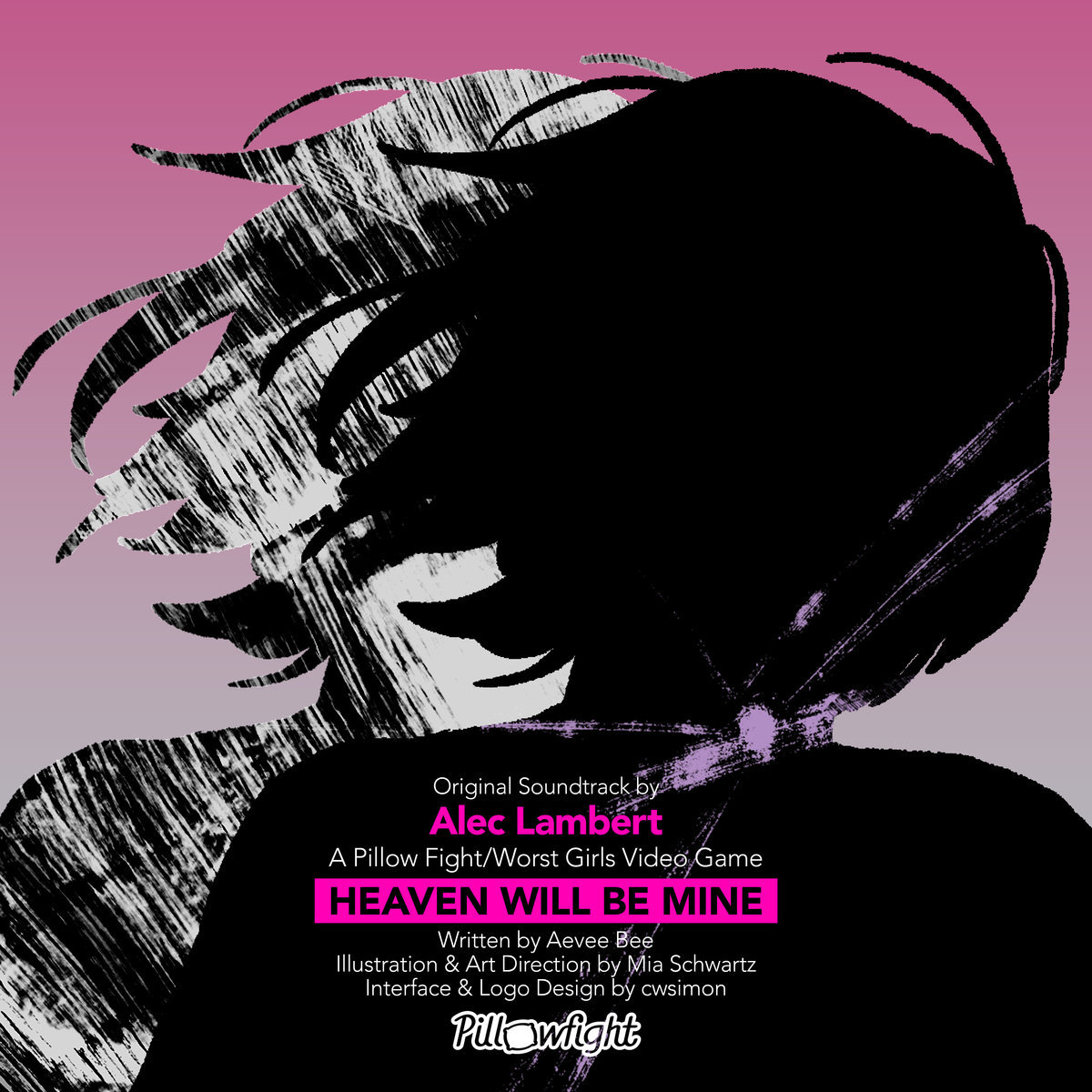
Composed by: Alec Lambert
DISCLOSURE: I worked on this game as a background and support artist. I like to think I can express pretty impartial thoughts about the music but it’s a conflict, still, so I’m stating that here.
If there’s a soundtrack on this list I’m going to go back to, time after time, to throw on as writing or drawing music, it’s Heaven Will Be Mine’s soundtrack. At least, that’s what I’ll keep hoping. Alec Lambert’s (We Know The Devil) score is such a beautifully haunting accompaniment to HWBM’s world that I usually end up in thousand-yard stares with every listen, my mind sunk into a dark void of its own.
It’s a soundtrack rough on bass in a way that’s just... fucking heavy on your shoulders. Heaven Will Be Mine’s narrative balances playful and morose but every scene, every codex entry, every email, and every encounter is setup with the often brutal punches of the score in a way that just... really sticks. It often contrasts what it accompanies but is so affecting that it’ll make sure that moment stays with you long after.
You can listen to and purchase the album on Bandcamp.
1. Tetris Effect
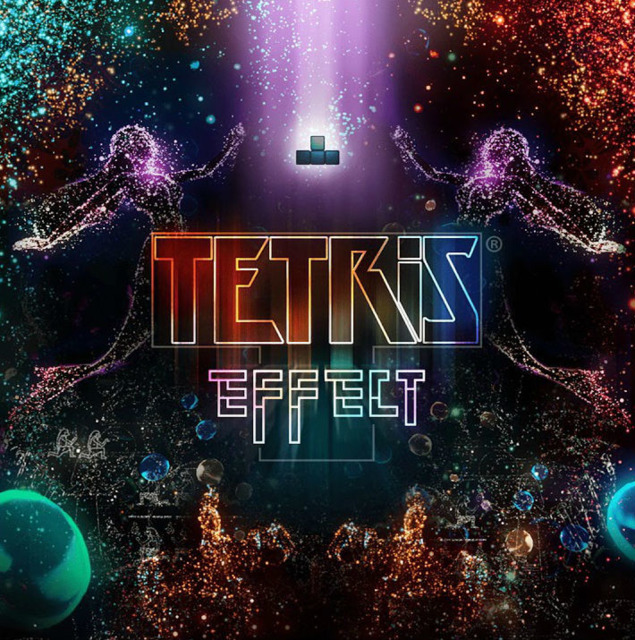
Composed by: Hydelic
Yo straight-up if this soundtrack did nothing for you then you are a frigid human being. Tetris Effect’s score is a vibrant celebration of human life in every way you’d expect from the minds behind Rez and Child of Eden, and it’s crazy to think that the year’s most unabashedly optomistic games is... Tetris.
Tetris Effect's Journey Mode feels like the fully realised vision of Rez’s interactive song structures and Lumines’ chaotic note creation. The way Mizuguchi makes his games has always super clicked with me but this feels like everything finally fell into the right place, where the act of playing Tetris Effect feels so integrally part of the experience instead of this, like, nice extra layer of “I’m makin’ music!” Things like making notes pitch up or down with the melody instead of being static contribute a great deal to making you feel like music is happening because of you.
It’s what’s made me come back to it over and over and over. Beyond just, the unbridled love I feel for the things around me when I’m done playing, Tetris Effect is maybe the only game this year that is a harmony of art, experience, and play. It’s a game that takes away the space between player and game to create a real connection that gets me borderline emotional any time I sit down to go through a longer play session. It’s so bizarre to be saying this about a Tetris game in 2018 but I’m honestly glad it is. The perfect video game finally got its perfect experience.
The official soundtrack was released in sampler form as a pre-order bonus, which is no longer available. Sorry!
Celeste
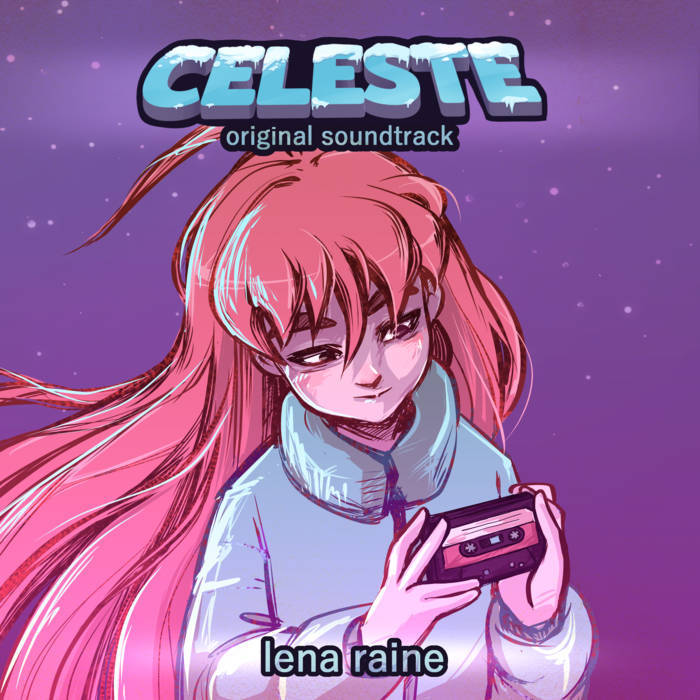
Composed by: Lena Raine
DISCLOSURE: Lena and I are dating. I love her and her music dearly but she doesn't know what I've written about her work on Celeste, partially because I'm a little shit and want to surprise her. I've separated this from my list because I'd rather this be where I can share my thoughts on being so close to her and the game's score.
This is arguably the biggest kind of conflict though so, once again, stating that here but I hope you still find this worth your time.
I remember interviewing a AAA game artist for a school project way back when who described his job as "being a mercenary" and that you "can't be too attached to the thing you work on." It was the first time I'd glimpsed into what making games was actually like and realised that, maybe, I wanted to do something different. I started talking to smaller people, smaller developers, smaller groups, because there was a freedom they had that I also wanted—to make something that was truly yours. That every corner of your work could reflect who you were as a person, what you valued, what inspired you, what you loved, what you feared.
Back in our Montreal apartment, Lena and I shared a tiny little room that was our office. We sat back-to-back, our chairs bumping into each other as we got up or just, like, moved in general. I'd draw with my own music on and during the silent breaks, I'd hear the sketching and experimenting that'd come to be the Celeste score. I think the thing that still baffles me the most is how much she was able to tune out from my kinda loud, like, J-core mixes and stuff. Anyway, as the soundtrack took form, I'd let albums or mixes run out and just sit in silence because I'd be way more entranced by what she was making than anything I could put on. She'd get home from her full-time job and nosedive into music without even taking time for herself. It would only take minutes for her to craft these beautiful melodies or work ones she'd already written into incredible soundscapes. She had so much in her head that she wanted to get out through music. It'd drown our office in sound and I was constantly inspired. I still think that my best work came from those months.
We both ended up hitting a bit of a personal turmoil around the time that the whole OST started taking its final form. I stopped hearing any of it around me and my own work just kinda slipped off as a result. No matter how small and avoidable they were in retrospect, Celeste would later bring life to how intensely difficult it is to overcome emotional barriers.
Lena has always worn her heart on her sleeve with everything she does but Celeste feels like she was finally given the stage for it to shine. Every part of her is in there. More than just having sounds reminiscent of the games she grew up on, or instrumentation honed from her time orchestrating massive scores with Guild Wars 2, there is heart and vulnerability in its tracks that come from an honest desire to express so much through music. It's the kind of thing that can't be asked for, can't be commissioned, or can't be forced. It was her first opportunity to create something that was truly hers, in a time where she didn't have any other means of doing so, alongside some other immensely talented people who all wanted to share in relating to a story.
The Celeste soundtrack is the resulting opposite of the AAA force. It's not mercenary and it's not budgeted to be bombastic and grand. It's a genuine embodiment of its artist, one so powerful and enchanting that it can erupt an entire crowd into chanting its voice. Every song is its own story, one Lena dug deep into her heart to tell. I thought it when it was just a skeleton of a score and still do now, but the Celeste soundtrack is a work of art and games as a whole is better for having it.
You can listen to and buy the soundtrack on Bandcamp or listen to it on Spotify.
Addendum: Please play The Missing

The Missing is my overall game of the year. It's a frustrating game with poor controls, bad checkpointing, and often inconsistent voice acting and I haven't been able to stop thinking about it since. I think it's the most important game to come out this year.
To dive into why, I'd need to spoil a whole lot that is critical to the development of the game's story, so I won't do that. It'll be hard to sell exactly why without it. All I can say is that its ending made me cry. I cried at what happened, I cried how it happened, and I cried because maybe there is hope for the future. I cried because, for once, I didn't feel like I had to explain years and years of pain to anyone for them to even begin to understand what some people go through. Someone, a team of people, on their own, got it and made a story to explain just how affecting it can be. It's a video game made so that people could learn to empathise, through narrative and brutally violent mechanics.
It's a SWERY game, so immediately you probably know what to expect as far as "strange" level goes, but The Missing is different than past efforts. It's laser-focused on what it wants to say and the path it takes to get there is captivating, even if mostly told through text message archives.
I'll stop myself before I get preachy enough to drive you away but The Missing is an experience I'll carry with me for a long long time, and one I hope marks the start of more games using what they are to convey a life's experience.